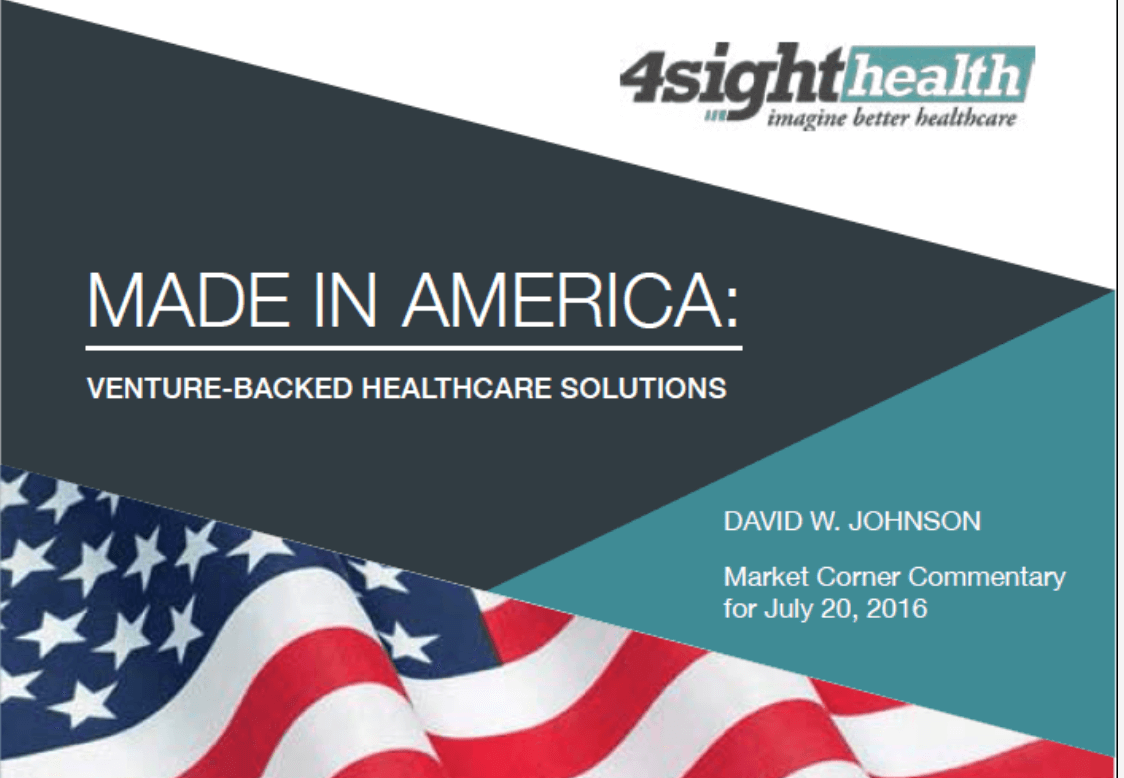July 19, 2016

Made in America: Venture-Backed Healthcare Solutions
Market Corner Commentary for July 20, 2016
Last month, Reed Abelson of the New York Times chronicled the challenges of Oscar Health, the venture-funded health insurance company. Despite massive investment, customer-friendly technology and slick marketing, Oscar is struggling to become profitable.
While Oscar may disrupt the health insurance industry and make billions of dollars for its investors, there is also the very real possibility that the company could fail. Investors could lose everything.
This is the beauty of the venture-funding model. It rewards success. It learns from failure. It moves forward. There is a relentless logic to venture investing. Most early-stage companies fail, but some succeed and a select few succeed spectacularly.
No other country comes close to matching the United States in innovation and value creation. America’s ability to encourage, fund and sustain entrepreneurs is the “secret sauce” that differentiates American capitalism. This American innovation engine is now attacking U.S. healthcare.
Venture-led, market-driven reform is America’s last, best hope for fixing its broken health system. Venture and private equity investments promote quality, eliminate inefficiency, enhance consumerism and create value.
Currently, America lags other advanced health systems. Americans pay more and receive less. Other systems rely on centralized payment structures and budgets to manage national health expenditures. By focusing on value-based delivery, market-driven health reform will enable American healthcare to leapfrog these health systems in all key cost and quality measures.
Obamacare’s Most Disruptive Feature
 Earlier this month, President Obama took the unprecedented step of authoring an academic research article to document the Accountable Care Act’s accomplishments and suggest improvements.
Earlier this month, President Obama took the unprecedented step of authoring an academic research article to document the Accountable Care Act’s accomplishments and suggest improvements.
Among his many observations, the President notes that some Health Insurance Marketplaces (a.k.a. state health exchanges) do not offer sufficient choice to American consumers. His proposed solution is to for the U.S. government to offer a “public plan option in areas lacking individual market competition.”
Right diagnosis. Wrong prescription. The government has proven no more effective than commercial insurers in managing treatment costs for the five percent of Americans consuming half of all health expenditure. These individuals disproportionately suffer from multiple chronic diseases, mental health disorders and complex end-of-life care.
A better solution would be to use market-specific incentives (e.g. higher individual subsidies, tighter “risk corridor” payments) to reward private companies that take more care management risk. The government would adjust these subsidies downward as private companies improve their care management capabilities. Medicare Advantage has employed this type of incentive structure with success.
Interestingly, it was Obamacare’s elimination of pre-existing condition exclusions and healthcare coverage caps that exposed the industry’s limited capacity to manage the care of distinct populations. This has proven to be the ACA’s most disruptive feature.
Historically, large commercial health insurers did not expansively manage the healthcare risk of large populations. Instead, they used exclusions and coverage caps to minimize their financial risk. Taking away these mitigation tools subjects health insurers to significant underwriting risks. The results to date have been catastrophic.
Aetna, Highmark, HCSC, Humana and United have suffered billion-plus-dollar losses on their public exchange insurance products. United and Humana are exiting several state exchanges. Many remaining insurers are dramatically raising their 2017 premiums.
Lack of care management capability is American healthcare’s greatest deficiency. It is also the industry’s most substantial business opportunity. Health companies that develop the expertise and capabilities to manage healthcare risk will dominate the post-reform healthcare marketplace.
Oscar’s Story

Launched in 2012, Oscar Health aspires to “revolutionize health insurance through technology, data and design.” They offer health plans that are “easy to understand, provide comprehensive coverage and include lots of free perks.”
Oscar began offering health insurance products on the New York and New Jersey public exchanges in 2014. At that time, co-founder Joshua Kushner described Oscar’s potential impact in the following words, “We’re trying to build something that’s going to turn the industry on its head.”
Oscar pays for all primary care visits, routine lab tests and generic drugs. No co-pays. No denials. 24/7 connectivity. User-friendly apps. Rewards for healthy lifestyle choices. What’s not to like? Oscar has attracted 135,000 members in New York State.
The trouble is Oscar loses 15 cents on every NY premium dollar it collects. Like its big insurance counterparts, Oscar has struggled to manage the healthcare costs of its high-use members. Without its own primary care network, Oscar has limited control over physician and patient behaviors. The company has requested rate increases approaching 20% for its New York health plans in 2017.
Oscar may experience consumer backlash from these new budget-busting insurance premiums. The company promises “smart, simple health insurance that will save you money.” By boldly proclaiming itself to be different and better, Oscar risks alienating its customers when it behaves like a traditional health insurance company.
Despite its challenges, Oscar is not “throwing in the towel.” Quite the contrary. According to Forbes, the company raised over $400 million earlier this year at a $2.7 billion valuation. Investors included Fidelity and Google Capital.
Oscar is using the funding to expand into new markets (California and Texas in 2016) and experiment with new business models. They’re adapting. In California, for example, Oscar is offering a narrow-network product in partnership with Providence Health & Services.
Some believe Oscar’s business model relies too much on its technology platform. Other care management companies (Iora, Pharos, Oak Street Health) have invested more in relationship-based care delivery. Perhaps that is a better strategy. Time will tell.
As the market matures, customers will determine which companies have superior business models through their individual purchasing decisions. If Oscar fails, the likely cause will be that the company wasn’t innovative enough. Incremental improvement on fragmented business models will not fix American healthcare. A Ferrari body on a Camry chassis won’t win any races.
Smart Money to the Rescue
Smart private equity and venture money is flowing into healthcare services in record amounts. It’s funding a remarkable range of innovative companies with a multiplicity of business models.
The business opportunity is huge. Companies that build trust with customers, address their individual health concerns pro-actively, provide expert care navigation, offer meaningful second opinions and price their products competitively will disrupt current business practices and win marketshare. When the dust settles, the American people will receive better, more convenient and more affordable healthcare services.
This bottom-up, evolutionary process is the essence of market-driven health reform. Markets are agnostic with regard to organizational structure and mission. They run on results. When given the opportunity, customers flock to companies offering higher-value products and services.
The beauty of the venture-funded innovation is that it sends multiple business models into the marketplace to compete for customers. The “fittest” companies emerge through a customer-driven form of natural selection. Winning companies create sustainable business models that deliver valuable products and services that customers willingly buy.
Perhaps Oscar will emerge as a dominant new health insurance company by delivering “simple, smart and friendly” healthcare. If not, other more innovative health companies with better operations and/or better execution will emerge, create superior business models and win customers’ hearts and wallets.
What’s clear is that market-level competition on price, outcomes and customer experience will improve American healthcare delivery.
It’s the Hard that Makes It Great

Loosely-based on Hall-of-Fame first baseman Jimmy Foxx, Tom Hanks plays Jimmy Dugan in the movie A League of Their Own. Dugan manages the Rockford Peaches in the new All-American Girls Professional Baseball League. Through a roller-coaster season Dugan rediscovers his passion for baseball and delivers multiple Yogi Berra-like quotes.
After preaching “there’s no crying in baseball,” Jimmy has a tough conversation with his best and favorite player, Dottie Hinson. Dottie’s quitting the Peaches to return home to Oregon with her soldier-husband. After Dottie pleads that it’s just too hard to remain with the team, Dugan utters these timeless words,
It’s supposed to be hard. If it wasn’t hard, everyone would do it. The hard… is what makes it great.
There’s real wisdom in Jimmy Dugan’s words. America’s healthcare pathologies have developed over decades. Diagnosing and curing them will not be easy. It’s not supposed to be. It will take investment, skill, adaptability and luck for companies to overcome the system’s imbedded inefficiencies and outperform like-minded competitors. All early-stage companies work hard, but only a few succeed.
America’s innovation engine is now working its market-based magic on the country’s under-performing health system. Its mantra is “Outcomes Matter. Customers Count. Value Rules.” As predictable as the sun rising in the east, market-driven reform will transform American healthcare.
This is a fitting moment to acknowledge and honor American exceptionalism. On this date 47 years ago, Neil Armstrong and Buzz Aldrin walked on the moon. This first moonwalk culminated a decade-long pursuit of a seemingly unattainable goal. The journey encompassed many failures, detours and surprises. In Jimmy Dugan’s words, the moonshot’s long and “hard” road to success made that triumphant moment truly “great.”
America’s ability to innovate is exceptional. Rooted in value, “Made in America” healthcare will leapfrog other centralized, national systems by delivering the right care in the right place at the right time at the right price.






